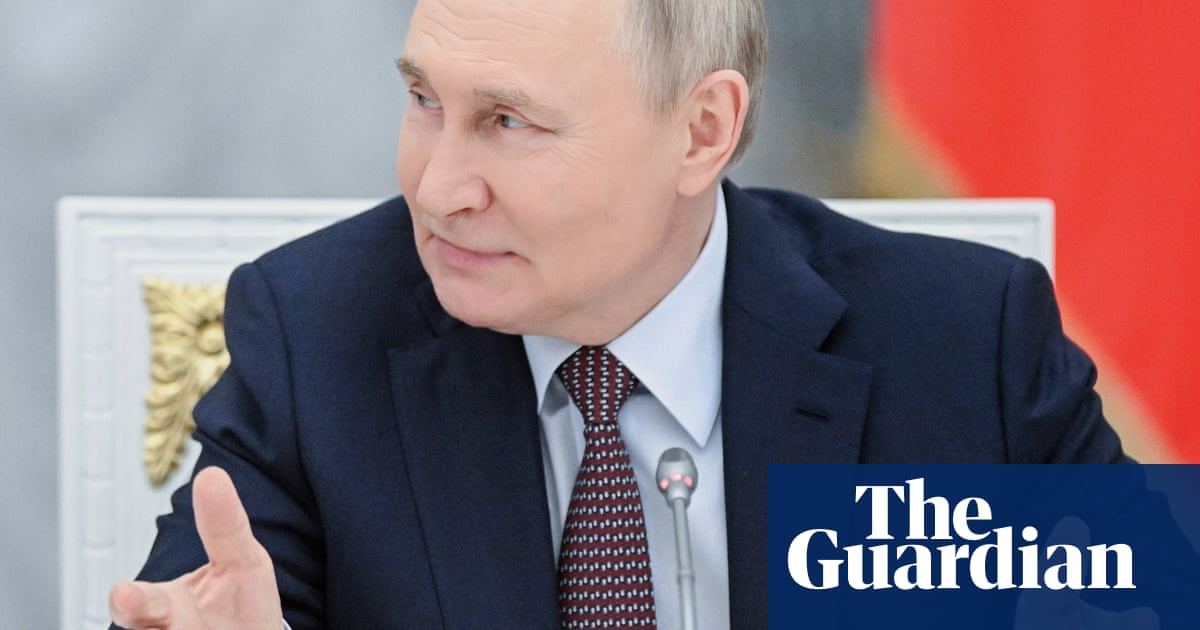The Kremlin is refusing for the third straight day to say if Vladimir Putin will travel to Istanbul on Thursday, or who will represent Russia at the potential peace talks, as international pressure builds on the Russian leader to meetVolodymyr Zelenskyy.
Putin’s spokesperson, Dmitry Peskov, told journalists in Moscow that he would announce the composition of the Russian delegation “once we receive the relevant instructions from the president”.
“So far, no such instructions have been given,” he added.
Zelenskyy challenged Putin to a personal meeting in Turkey after the Russian leader used an unexpected late-night Kremlin address to call for direct Russia-Ukraine negotiations inIstanbul.
Much is still unclear about Thursday’s talks, which are taking on growing importance amid escalating rhetoric and strategic posturing by both Russia andUkraine.
A senior Russian lawmaker said the makeup of Moscow’s delegation would be made public on Wednesday evening, adding that an all-for-all prisoner exchange could be on the table. “About Istanbul, I won’t say anything, you’ll know everything in the evening,” said Leonid Slutsky.
Meanwhile Zelenskyy, speaking to a small group of journalists including the Guardian, said he wouldtravel to Turkey on Thursday, whether or not Putin flew in for talks.
The Ukrainian president said was meeting the Turkish president, Recep Tayyip Erdoğan, in Ankara, and would be ready to fly to Istanbul at a moment’s notice if the Russian leader showed up. “If Putin does not arrive, and plays games, it is the final point that he does not want to end the war,” he said on Tuesday.
Donald Trump has publicly urged Zelenskyy to accept the offer of negotiations and said he hoped Putin would attend. The US president also unexpectedly suggested on Monday that he might attend the meeting, which aligns with his planned trip to the Middle East this week, an idea Zelenskyy was quick to embrace.
Trump on Wednesday said he did not know if Putin would be in Turkey, but there was a “possibility” he would divert to the countryif the Russian president was there. “He’d like me to be there, and that’s a possibility … I don’t know that he would be there if I’m not there. We’re going to find out,” Trump told reporters aboard Air Force One en route to Qatar.
Trump, however, noted that he was scheduled to be in the United Arab Emirates on Thursday, on the third and final leg of his Gulf tour. But, when asked about visiting Turkey, he added: “That doesn’t mean I wouldn’t do it to save a lot of lives.”
The US president said he would send the secretary of state, Marco Rubio, and the senior envoys, Steve Witkoff and Keith Kellogg, to Turkey.
Brazil and China, which both have warm ties to Moscow, also backed talks between Russia and Ukraine.
Speaking at a press conference in Beijing, Brazil’s president, Luiz Inácio Lula da Silva, said he would push Putin to take part in the talks with Zelenskyy. “I’ll try to talk to Putin,” Lula said, adding that he planned to travel to Moscow. “It costs me nothing to say, ‘Hey, comrade Putin, go to Istanbul and negotiate, dammit.”
Brazil and China had issued a joint statement on Tuesday calling for direct negotiations as the “only way to end the conflict”.
Putin and Zelenskyy have met only once, in 2019, and Moscow has repeatedly portrayed the Ukrainian leader as illegitimate.
In Istanbul, Ukraine is expected to call for a full 30-day ceasefire as a starting point for further talks.
Moscow has consistently rejected extended ceasefire proposals, arguing they would give Ukraine time to rearm and regroup at a moment when Russian forces are advancing on the battlefield.
Russian officials have indicated they will press for maximalist demands in Istanbul, similar to those made during the failed round of talks in Turkey in spring 2022.
European leaders have promised to increase pressure on Russia if the talks in Turkey failed, but the key question remains whether they can bring Trump on board with their efforts to tighten the screws on Moscow.
